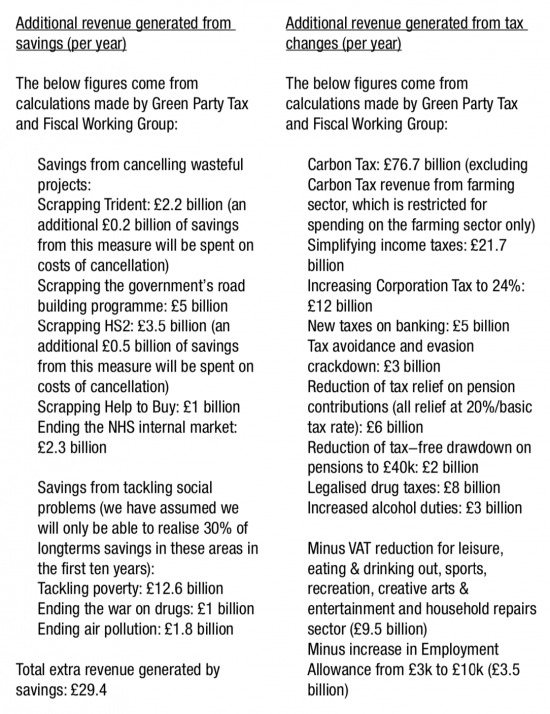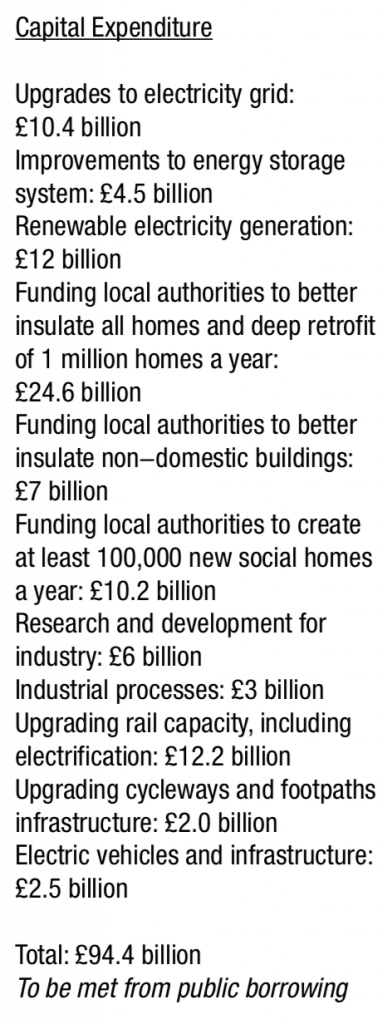I like what the Green Party has to say on the Green New Deal. So much that I am going to post it. But if you want to read my criticism of the Green Party manifesto, skip to the end of this post. 

 That is the Green New Deal as I recognise it. They did not write it as they claim, although Caroline Lucas did play a part, of course. But we'll forgive them the claim.
That is the Green New Deal as I recognise it. They did not write it as they claim, although Caroline Lucas did play a part, of course. But we'll forgive them the claim.
So what's the issue? It's a simple one. They say they are going to0 pay for it with tax. This is the summary:
Net that's £95 billion a year of tax raised, and much of it is deeply regressive. I know there is a proposal for a UBI as well - but first I am not convinced that these tax changes fund that and second that UBI is insufficient, I think, to overcome this regressiveness. I am worried by this. Carbon taxes are regressive. We cannot get around that fact.
The better news is this:
This is the Green New Deal plan in action.
What is not said is how the borrowing will be incentivised. I've done that here.
It's good, in summary. But that carbon tax and UBI may be a step too far in an unknown direction that could backfire horribly.
Thanks for reading this post.
You can share this post on social media of your choice by clicking these icons:
You can subscribe to this blog's daily email here.
And if you would like to support this blog you can, here:





With UBI it depends upon the level it is set per person and how it is phased in. Presumably some sort of trial will be made in certain regions and a full roll out may take several years. At least the Greens are making some attempt to deal with the massive unemployment that may arise with more automation in industry and commerce and the imbalances of increasing inequality.
Thank you Richard for such a thorough and incisive analysis. Your assessment is far more reasoned, detailed and better argued than I have found anywhere else.
Perhaps, given the electoral potential of the Green Party, the lack of incentivisation for the investment as borrowing is not the Greens’ most worrying failing. I’m thinking of Chris Saltmarsh’s article in/on “Bright Green – Independent Media for radical, democratic, green movements” http://bright-green.org/2019/11/20/what-do-greens-and-the-billionaire-press-have-in-common/
Specifically, it seems the Greens are more worried about not upsetting the LibDem neoliberal wing of the electorate, including the billionaires’ free press. I know many eco-socialists in the Green party and feel their pain as their leadership destroys their integrity by playing with the wretched Swinson and swinsonates-away their moment of history. Happily though, their bad politics will not damage the ecosocialist cause or its moment in the sun.
Let’s agree Swindon is a disaster not to be appeased
Bit harsh on Swindon; I know Betjeman gave Slough a time of it, but Swindon…
Jo Swinson, on the other hand, bit of a disaster there…
Sorry! Autocorrect…..
I’m assuming that the figures in the final Green Party text block are per year figures? £94.4bn per year – to be met from public borrowing?
If it is, then I wonder where the £10bn/yr on networks will be spent? Gold wires? (keep in mind – I used to build power networks & still know what they cost)
Figures for renewables look fair enough on a per year basis.
I am sure it is pa
Then the network number is seriously out of whack. I can make some guesses why that might be – probably assume that de-carb is via the 100% electricity route – which is a mistake. EU, after some time, has finally recognised that elec & gas networks (carrying hydrogen) must work together. Looks like the greens are still not quite there – hence the amazing spending on networks.
Too much of the Green Party’s stuff looks like garden shed engineering to me – a bit amateurish. They have two very photogenic people at the front and some good ideas but practical execution detail is lacking.
Tis’ a shame. I see it too at a local level.
Personally, I like some garden shed engineering – whilst we need top down policy, direction of travel and funding from government, we also need those at the garden shed.
At our local authority, there is an excellent Tree Officer – his day job involves allowing trees to be removed in almost all planning applications, which must be tedious and frustrating for him. About a year or so ago, he wrote a policy proposal for incorporating more tree planting in the local authority area. It was quickly quashed by the Tory majority of Councillors. Thankfully the Greens have recently increased their numbers of Councillors and they are taking it forward, although still being thwarted by the system.
My fear is that with e.g. retrofitting energy saving measures to older buildings, contracts will be given to large outsourcing companies that will repeat the failed cavity wall insulation initiative. We need to draw together ‘garden shed’ people who understand how buildings function, in order to get the better ideas of how to improve energy efficiency. For example: in older buildings secondary windows are often better than double glazing units, breathable renders are much better than cement based ones.
My point is that there are some incredibly useful and knowledgeable people out there – probably in sheds….
Sorry Prentii but there are a lot of garden sheds out there that are so badly constructed I don’t know how they stand up or failing that are just not designed to put up with to the infamous British weather – whichever genius’ hang about in them.
The same goes for some for the Green policies that despite Richard’s input seem to badly grounded in reality.
For there to be change, the alternatives have to be up to the job and give a believable road map towards realisation. There are very nice people out here who care and want change but seem all too often unwilling to take on board for example the issues surrounding money creation that are extensively kicked about on this blog.
Wanting to change the world is one thing; how you do it from a practical sense is another.
You cannot change that of which you remain ignorant of.
Bottom line: we need better sheds.
🙂
(I am being somewhat liberal with these right now…..)
£8 billion in legalised drug taxes!
How much do they think people are going to be spending on drugs???
A fortune
It’s obviously not the most vital issue at hand but it suggests that they believe that they can replace the entire illegal UK drug market with a regulated and taxed market within a parliament. I would love to see someone from their party explaining the regulated and taxed cocaine market.
They are a ridiculous party who do a decent job of moving the Overton window on a few subjects but should not be attempting to take votes away from Labour under FPTP.
With respect, it’s your comment that is ridiculous, or worse, since it shows a contempt for democratic choice
To simultaneously believe that we face an existential climate crisis and enter into a pact with Jo Swinson who is pro fracking and the Lib Dems who are likely to prop up another environmentally disastrous Tory government is completely incoherent.
The Green Party have clearly lost their way as other parties have done in the past. And as you point out in the article they are incapable of recognising that ecological solutions require redistributive policies and social justice for all. This is no doubt due to the class make up of their activist base.
Sorry. But there were reasons for that. And being anti-Tory explains it
No question that Universal Basic Services are quicker and more effective than UBI, better at tackling the damage done by inequality and less vulnerable to the neoliberals who can’t wait to use UBI as a chance to roll back the state.
The macroeconomic case against a UBI is simply this: a currency is worth what it is necessary to do to obtain it.
If the government unconditionally provides everybody with an amount of currency that is designed to be enough to live on, it actually defeats the purpose of issuing a currency and imposing tax obligations denominated in that currency. The purpose of this arrangement, which authorities have been using for all of recorded history (the past 6000 years), is to enable the government to command the real resources that it needs to fulfill the functions of a government. The purpose is to achieve a transfer of some real resources from the private domain to the public domain.
If you point out that truth to UBI advocates, they often say, “Well, the government should provide a UBI that isn’t enough to live on — a UBI that is just a supplement to earned income.” But how do you prevent a supplemental UBI from becoming a de facto wage subsidy to employers? What stops employers from factoring in the supplemental UBI that their workers are getting and lowering wages accordingly?
That is what happens with the first home buyer’s grant in Australia. The grant is simply factored into the asking price. The first home buyer’s grant provides no net benefit to the home buyer. It is a subsidy to the seller.
The macroeconomics of a UBI simply don’t add up.
Let us by all means provide a generous basic income for people of retirement age and people who have constraints on their capacity to work. But making such a payment universal would be macroeconomically unstable. A UBI is either set at a level that is not enough to live on (and is therefore effectively just a wage subsidy that benefits employers rather than workers), or it is set at a level that makes it macroeconomically unstable (resulting in people not actually getting the goods and services that they need for a decent life). Either way, there is no point in doing it… unless you are a libertarian or a conservative whose goal is to reduce the scope of government activity.
Andrew Yang’s proposal is an example of a supplemental UBI (i.e. not enough to live on). It is a stalking horse to gut social security and reduce government spending on services and infrastructure. That is why so many libertarians and billionaires like the idea.
William Mitchell, Stephanie Kelton, Pavlina Tcherneva, Scott Fullwiler, Randall Wray and others have done top quality macroeconomic work on UBI proposals. Their conclusion is that a UBI would be highly prone to accelerating inflation. I trust their judgement. Their logic is unimpeachable.
Sorry, but on that basis we pay no benefits to those in work
And that makes no sense at all
There are reasons to prefer a job guarantee, but this blanket argument is simply wrong
There is no simplistic answer to such a complex issue whatever some say